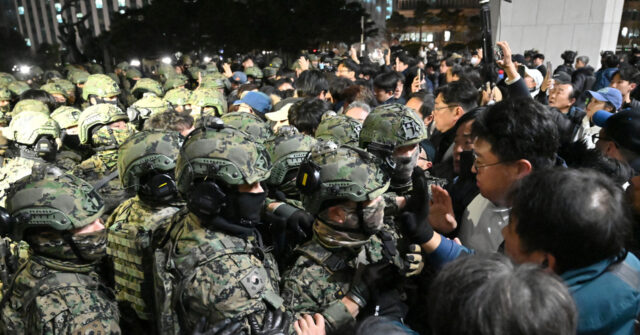The recent declaration of martial law by South Korean President Yoon Suk-yeol took both his government and the Biden administration by surprise. President Yoon justified the decision as a necessary move to combat obstructionism by the opposition Democratic Party in the National Assembly, which he described as a “den of criminals.” He further claimed that this measure was essential for safeguarding South Korea against undefined “North Korean communist forces.” However, the declaration triggered swift backlash, prompting lawmakers from the Democratic Party to act quickly to oppose such drastic measures. They overcame barriers and rushed to the National Assembly, ultimately voting against the martial law within hours of its announcement, causing Yoon to retract his declaration almost immediately after receiving unanimous opposition.
As the situation unfolded, the prospect of impeachment now looms over President Yoon, following a formal complaint that garnered the support of six political parties. For impeachment to proceed, it requires a two-thirds majority in the National Assembly, indicating significant internal strife within the South Korean political system. Yoon’s governance and actions may have alienated not just his opponents but also members of his own People Power Party (PPP). The declared emergency also casts a shadow over South Korea’s democratic norms, raising concerns about the stability of elected institutions and governance.
On the international front, the lack of prior notification about the martial law statement from Yoon to the Biden administration raised eyebrows. During that time, President Biden was engaged in foreign discussions in Angola. A spokesperson from the U.S. National Security Council confirmed the administration’s surprise at Yoon’s announcement and expressed concerns about South Korea’s political situation. Following Yoon’s rapid retraction, U.S. Secretary of State Antony Blinken acknowledged the events and reiterated the expectation that political disputes should be resolved within democratic frameworks. The Biden administration stopped short of outright condemning the martial law declaration, instead expressing relief at its withdrawal while affirming their longstanding support for the South Korean government and its democratic processes.
American Ambassador to South Korea, Philip Goldberg, echoed sentiments from Washington, admitting that the announcement caught the U.S. off guard. He emphasized the resilience of Korean democracy and reinforced the Biden administration’s commitment to supporting South Korea. However, the unfolding situation has also exposed a shaky alignment between the Biden administration and Yoon’s government, especially regarding North Korea’s provocations. President Yoon has adopted a hardline stance against the North, exacerbating tensions with the Biden administration, which has approached North Korea with relative caution and a lack of proactive policy measures.
Despite the discord, Yoon has attempted to strengthen security measures in light of increasing threats from North Korea. He has voiced strong support for South Korea potentially developing its own nuclear capabilities, a notable shift that clashes with U.S. policy. The Biden administration has previously demonstrated a commitment to denuclearization and non-proliferation, creating a rift in perceived approaches to North Korean threats. In stark contrast, Yoon’s administration pursued an aggressive posture, exemplified by the deployment of strategic U.S. military assets in the region, including the USS Kentucky, a nuclear ballistic missile submarine, signifying a recalibrated deterrent strategy against the North.
The ongoing political crisis in South Korea, with the backdrop of North Korean tensions, reflects broader challenges within the region. Yoon’s attempts to leverage support from global partners are indicative of desperate measures taken to secure national interests amidst looming threats. Such geopolitical maneuvering may have long-term ramifications for the U.S.-South Korea alliance, traditional frameworks based on mutual interests, and global responses to North Korean aggression. As Yoon’s presidency faces heightened scrutiny and possible impeachment, the necessity for coherent, decisive policy approaches towards North Korea and maintaining South Korea’s democratic integrity becomes increasingly urgent for both the South Korean leadership and the Biden administration.

